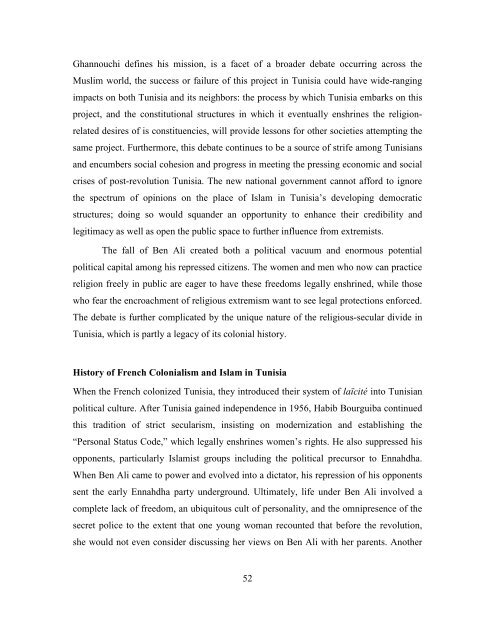Tunisia: Understanding Conflict 2012 - Johns Hopkins School of ...
Tunisia: Understanding Conflict 2012 - Johns Hopkins School of ...
Tunisia: Understanding Conflict 2012 - Johns Hopkins School of ...
You also want an ePaper? Increase the reach of your titles
YUMPU automatically turns print PDFs into web optimized ePapers that Google loves.
Ghannouchi defines his mission, is a facet <strong>of</strong> a broader debate occurring across the<br />
Muslim world, the success or failure <strong>of</strong> this project in <strong>Tunisia</strong> could have wide-ranging<br />
impacts on both <strong>Tunisia</strong> and its neighbors: the process by which <strong>Tunisia</strong> embarks on this<br />
project, and the constitutional structures in which it eventually enshrines the religionrelated<br />
desires <strong>of</strong> is constituencies, will provide lessons for other societies attempting the<br />
same project. Furthermore, this debate continues to be a source <strong>of</strong> strife among <strong>Tunisia</strong>ns<br />
and encumbers social cohesion and progress in meeting the pressing economic and social<br />
crises <strong>of</strong> post-revolution <strong>Tunisia</strong>. The new national government cannot afford to ignore<br />
the spectrum <strong>of</strong> opinions on the place <strong>of</strong> Islam in <strong>Tunisia</strong>’s developing democratic<br />
structures; doing so would squander an opportunity to enhance their credibility and<br />
legitimacy as well as open the public space to further influence from extremists.<br />
The fall <strong>of</strong> Ben Ali created both a political vacuum and enormous potential<br />
political capital among his repressed citizens. The women and men who now can practice<br />
religion freely in public are eager to have these freedoms legally enshrined, while those<br />
who fear the encroachment <strong>of</strong> religious extremism want to see legal protections enforced.<br />
The debate is further complicated by the unique nature <strong>of</strong> the religious-secular divide in<br />
<strong>Tunisia</strong>, which is partly a legacy <strong>of</strong> its colonial history.<br />
History <strong>of</strong> French Colonialism and Islam in <strong>Tunisia</strong><br />
When the French colonized <strong>Tunisia</strong>, they introduced their system <strong>of</strong> laïcité into <strong>Tunisia</strong>n<br />
political culture. After <strong>Tunisia</strong> gained independence in 1956, Habib Bourguiba continued<br />
this tradition <strong>of</strong> strict secularism, insisting on modernization and establishing the<br />
“Personal Status Code,” which legally enshrines women’s rights. He also suppressed his<br />
opponents, particularly Islamist groups including the political precursor to Ennahdha.<br />
When Ben Ali came to power and evolved into a dictator, his repression <strong>of</strong> his opponents<br />
sent the early Ennahdha party underground. Ultimately, life under Ben Ali involved a<br />
complete lack <strong>of</strong> freedom, an ubiquitous cult <strong>of</strong> personality, and the omnipresence <strong>of</strong> the<br />
secret police to the extent that one young woman recounted that before the revolution,<br />
she would not even consider discussing her views on Ben Ali with her parents. Another<br />
52
















